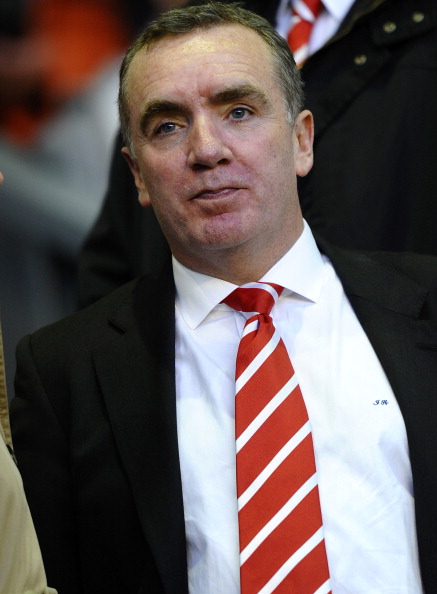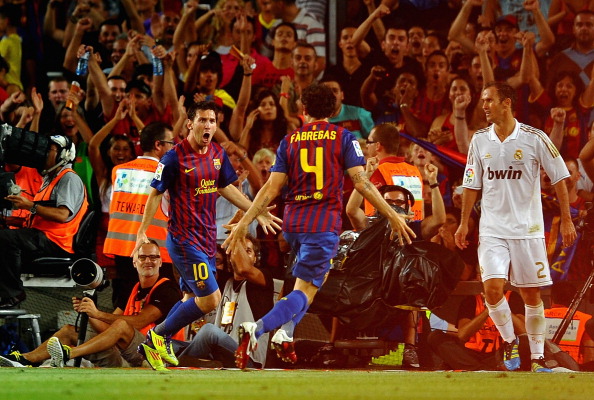And so there I was, putting pen to paper (or finger to keyboard) on an explanation of why Liverpool’s chief executive Ian Ayre was right to bring up the issue of the collective television bargaining agreement that exists in the Premier League, and whether top clubs should go it alone in signing rights agreements with broadcasters.
True, he has less chance of success with this battle in the Premier League boardroom than a tourist has of leaving Mexico without getting clenbuterol into their system – and for that true football fans should be thankful.
But he was right to say what he did because it brings into sharp focus the looming danger of Barcelona and Real Madrid dominating European club competitions in the same way they currently monopolise Spain’s Primera Division.
In Spain, Barcelona and Real won 99 and 96 points respectively in 2010, and last season claimed 96 and 92 points each. These are astronomical totals, demonstrating excellence on their part rather than feebleness in their rivals.
These two teams are streets ahead of their closest challenger, Valencia, mainly thanks to the financial clout reinforced by huge revenues made from TV, able as they are to negotiate individual rights deals with broadcasters. The top two can expect to receive €120 million (£140.4 million/$166.5 million) plus each season, an amount twice as high as that of Manchester United, the Premier League champions.
Valencia take roughly a third of that figure. In the Premier League on the other hand, United receive one and a half times what the team finishing bottom can expect to take home. The Primera Division’s uncompetitive nature is a reminder of what happens when a league goes for individual television rights negotiation, rather than the collective mode, and this is the cause of the predictability of the Spanish top flight. This was also the basis of my argument – why Ayre was absolutely right to raise this issue.
And then along came Juan Ignacio Martínez.
Martínez was appointed as coach of the Primera Division outfit Levante this summer and they remain unbeaten in their eight league games so far this season. They have won their last six matches in a row, meaning they now sit proudly between Barcelona and Real at the top of the table.
This is a team who climbed above both Barcelona and Real Madrid after successive 3-0 wins over the Qatari funded Malaga, who this summer signed Santi Cazorla for a fee within the region of Levante’s annual budget (€22 million/ £19 million / $30 million), and Champions League Villarreal (whom Malaga signed Cazorla from). Their most expensive player cost less than Real pay each month to Cristiano Ronaldo, or Barcelona to Lionel Messi.
While Martínez and Levante’s case can be described as ‘the exception that proves the rule,’ the evidence suggests the Primera Division’s individual television bargaining threatens the competitive nature of European football – and this was the underlying point Ayre (pictured) made last week.

Last season, the Champions League was ultimately decided between the two Spanish giants in the semi-finals, where Barcelona overcame their great rivals from the capital, Real, after a controversial tie. The final was never a contest – Barcelona brushed Manchester United aside with comparative ease. That a team of United’s stature, the Premier League champions – managed by arguably the greatest coach in the sport – were no match for Barca should concern those at UEFA.
As the Primera Division’s chairmen have recently pointed out – notably the Sevilla President Jose Maria Del Nido and Villarreal’s Fernando Roig – the Spanish league has become dull. Who will watch when Barcelona and Real are winning five, six or seven-nil every week? The same applies to the Champions League. If Barcelona can beat Manchester United with the ease they did last year, and have their position entrenched by their ability to make far more than any other team (excluding Real) from television rights, then how long will it be until they are beating Europe’s ‘best’ by similar scores?
The same goes for Real, who would surely have been more dominant in European football had they not fired 10 managers in seven years. England’s best are still valiantly clinging to the coat tails of Barcelona, and can just about argue parity with Real, but the big question for them is for how long this can last?
Surely no more than a few years, and it is this which Ayre alluded to in his controversial comments last week when he went from dismissing Bolton as a team the Far East weren’t interested in to a far more perceptive and valid criticism.
“At some point we definitely feel there has to be some re-balance,” he explained.
“What we are actually doing is disadvantaging ourselves against other big European clubs. If Real Madrid or Barcelona have the opportunity to truly realise their international media value potential, where does that leave Liverpool and Manchester United?”
The re-balance Ayre alluded to is fundamental. Without it, the balance in European football will shift further in the direction of Barcelona and Real. It is a point the Arsenal manager, Arsene Wenger, made earlier this season. To paraphrase another meaningless cliché – it’s the economy, stupid. Liverpool, Arsenal and even Manchester United will be unable to compete for the top prize in European football unless they are either able to negotiate television rights deals on an individual basis, or the Spanish league moves to a collective model.

Failing either of these scenarios, any pretence of parity will soon be a distant memory in the Champions League. And even if the Primera division agrees a new collective television deal it has to be genuinely equitable. Last year the 40 teams in Spain’s top two leagues agreed a deal which would entrench Barcelona and Real Madrid’s dominance of the money made from television rights, guaranteeing them a 34 per cent share of revenues. This would not be sufficient, and it is this which Sevilla and Villarreal have led the fight against in recent weeks, the former organising a meeting of the Primera division’s other 18 sides to lead a fight against the big two.
It is for these reasons that Ayre’s intervention is welcome as it reminds us of the urgency of this situation. We are forever reminded that football is now a business but this is only partly true. A club’s primary goal is to win trophies – if it wasn’t, would so many of the biggest teams in Europe (and those who bring in the most money) be running yearly deficits? Would there be a need for UEFA’s new financial fair play initiative if these clubs were truly run like businesses?
Why have men like Malcolm Glazer and Randy Lerner, the owners of Manchester United and Aston Villa, and more pertinently highly successful businessmen, only worsened their respective teams’ debts since arriving on these shores? They are proof that football is still primarily a sport and, in sport, competition is damaged by financial inequality. There is no fun in watching the same teams win 7-0 every week, it simply devalues the product.
This is what Spain’s teams, the top two aside, have been continually saying. Their individual TV rights model is a danger to European football. UEFA knows it too, as Sevilla’s vice-President Jose Maria Cruz revealed to insideworldfootball last month. But they also know that there is little they can do in practise to change the situation in Spain. It may seem far away, but the battle being waged by Spain’s smaller sides is one which is beginning to affect us all, and Ayre’s comments are proof of that. We might not agree with the Liverpool chief, but his comments are worth taking seriously. Whether Sevilla, Villarreal and co. can win this off-field battle could be pivotal to the future of European football on the pitch.
David Gold is a reporter for insideworldfootball

